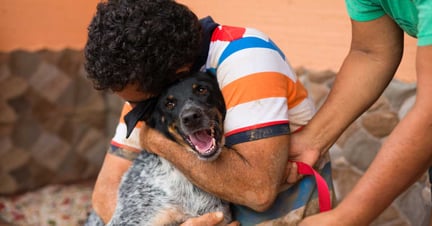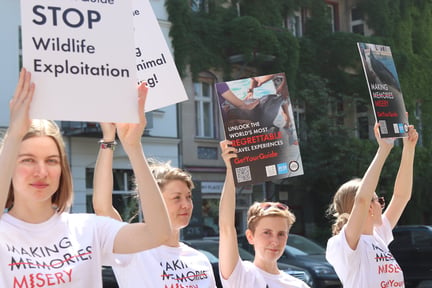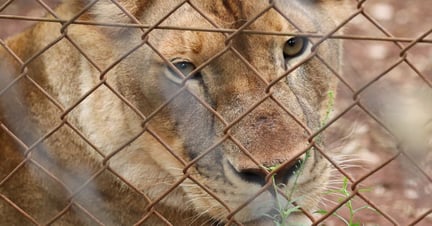
In many places across the world, it’s impossible to walk down a street without seeing a person and their dog walking side by side.
Dogs have a prominent place in our lives and we share a special bond. But rabies can easily tear that bond to pieces.
Last month I visited Makueni County, Kenya, where we’re working with the local government to vaccinate dogs against rabies. Makueni County has one of the highest rates of rabies in Kenya. During our visit, we met many people who’ve been affected by this awful, but preventable, disease.
The facts about rabies
It’s a scary disease – and so is its impact. Over 55,000 people die every year from rabies (that’s 150 a day), and in around 99% of these cases, the person has been bitten by a rabid dog. In response, governments commission mass culls in a misguided attempt to control the disease. And some communities even take it upon themselves to kill dogs they think could be a threat.
But this tactic is both cruel and ineffective. Both human and dog rabies can be prevented without culling.
A dog’s life in Makueni County
Makueni County’s 125,000 dogs are an important part of daily life. They are herdsmen, helping to guide livestock from place to place. And at night they are watchmen, keeping an eye on their family compound and chasing away dangerous animals or intruders. But when a dog is suspected of having rabies, it risks being beaten or poisoned by people who feel they have no other choice.
John's story
The team and I met John Munyinyi, who told us how rabies has had a devastating effect on his family. John lost his niece, Mbula, to rabies when she was just 30 years old. She loved keeping dogs and herding livestock, but one day was bitten by a rabid dog.
Mbula had three children, and after she passed away John became their guardian. But John is elderly and he cannot afford to send the children to school, trapping them in a cycle of poverty. Just a few months after Mbula’s death, John’s niece, Linnet, was bitten by their puppy. John felt there was no other choice but to put the puppy down. The puppy had never left the compound and had not been around other dogs. So rabies was unlikely. But after what happened to his niece, he felt there was no choice.
John told us he is happy that Makueni’s dogs are set to be vaccinated against rabies, so that this does not happen again. And when the vaccination team arrive in his area, he’ll be the first in line to get his new puppies vaccinated.
Dogs don’t need to die
Like John, most people we spoke to had a story to tell about rabies. We met people who’d lost a loved one to the disease, or had lost dogs to baiting during an outbreak.
Our aim is to make these stories history.
This World Rabies Day, Kenya is celebrating the first anniversary of the launch of its strategy to eliminate rabies by 2030. It’s the first country in Africa to have such a strategy. It’s based on strong evidence that shows that, by vaccinating at least 70% of the dog population for several years, human rabies can be eliminated. We’re working with Makueni County’s local government to implement a pilot programme to prove that mass dog vaccination works.
And we’ve already vaccinated over 5,000 dogs under this pilot.
Makueni County will become an example to the rest of Africa that rabies can be beaten without killing dogs. And Africa could become an example to the rest of the world.
World Rabies Day
This World Rabies Day, help us to achieve better lives for dogs around the world.
- Use #EndRabiesTogether on your social media accounts to spread awareness of World Rabies Day
- Watch our Herd immunity video to find out more about why culling doesn’t work
- Visit our Better lives for dogs page to find out more about the work we’re doing to protect dogs against inhumane culling globally
Related content
Animal Awareness Days
Sentience
Let's celebrate animals! Enjoy our list of official and unofficial animal awareness days observed around the world, nationally, and internationally.
Animals in Communities
Helping governments to manage dog populations humanely and to vaccinate against rabies, instead of culling animals - especially dogs.
Animals in Disasters
Disasters kill and injure millions of animals each year. We’ve been deploying to disaster zones to assist animals for 55 years – and we remind governments to take responsibility for them too






